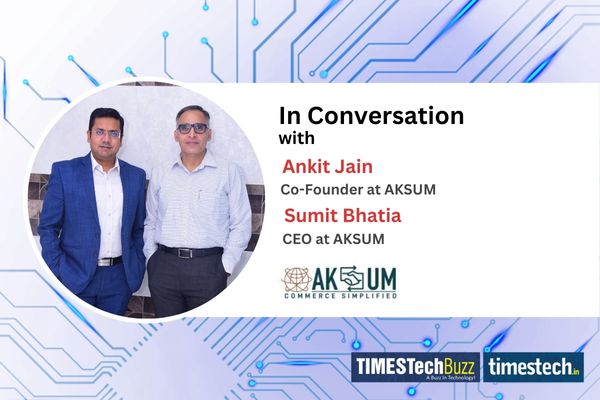In an interview with TimesTech, Ankit Jain, Co-Founder, and Sumit Bhatia, CEO of Aksum, discuss how their AI-powered B2B platform is revolutionizing supply chain management for MSMEs in India. They highlight key innovations such as automated procurement, real-time credit evaluation, and sustainable sourcing, ensuring efficiency, transparency, and financial inclusion for businesses nationwide.
Read the full interview here:
TimesTech: Aksum is revolutionizing supply chain operations in India. What inspired you to create a B2B technology-enabled distribution platform, and how does it differentiate from traditional procurement models?
Sumit: Aksum was born out of a need to streamline and bring transparency to B2B procurement and distribution. Traditionally, supply chains in India have been fragmented, with multiple layers of intermediaries causing inefficiencies in pricing, logistics, and financing. Our goal was to eliminate these inefficiencies by leveraging technology. Unlike conventional procurement models that rely heavily on manual negotiations and human intervention, Aksum automates the entire process—from quotation to order fulfillment. By integrating AI, real-time transactional data, and digital credit assessment tools, we ensure that businesses, especially SMEs, can procure materials more efficiently, at better prices, and with improved working capital solutions.
TimesTech: How has your experience in B2B aggregation influenced your approach at Aksum?
Sumit: I gained deep insights into the challenges faced by SMEs in procurement, such as limited access to bulk pricing, working capital constraints, and supplier fragmentation. Aksum builds upon those learnings by offering a more tech-driven and scalable solution. One major lesson has been the importance of data-driven decision-making—rather than relying on traditional market intelligence, we use AI-powered insights to predict demand, optimize inventory, and assess creditworthiness in real-time. Another key takeaway has been the need for financial partnerships; at Aksum, we work with banks like SBI, ICICI, and HDFC to facilitate seamless credit access for our buyers and suppliers.
TimesTech: AI-driven engines play a crucial role in Aksum’s platform. Could you elaborate on how AI enhances pricing, credit evaluation, and negotiation processes for MSMEs?
Sumit: AI is central to our platform, making procurement and financing more efficient and transparent.
- Pricing Optimization: Our pricing engine factors in commodity trends, demand patterns, and global market conditions to offer real-time, competitive pricing. By analyzing market fluctuations, AI helps us decide the optimal margin, ensuring buyers get the best price without sacrificing supplier profitability.
- Credit Evaluation: Traditionally, financial institutions rely on historical financial statements to assess creditworthiness, which often does not reflect real-time business health. Aksum integrates real-time GST data, bank statements, and transaction history into its AI-driven credit assessment models, allowing for dynamic risk evaluation and better lending decisions.
- Negotiation Automation: By using AI-driven analytics, we match suppliers and buyers efficiently, removing unnecessary middlemen and streamlining negotiations. This ensures that MSMEs can access competitive pricing and secure financing without lengthy manual processes.
TimesTech: Scaling a technology-driven supply chain model across multiple industries can be complex. What are the biggest challenges you’ve faced in expanding Aksum’s reach, and how have you overcome them?
Sumit: Scaling across industries like steel, infrastructure, and MRO has been both an opportunity and a challenge. The biggest hurdles include:
- Adapting to Industry-Specific Needs: Each sector has unique procurement requirements. For example, steel procurement requires bulk pricing optimization, while MRO demands just-in-time inventory solutions. We’ve tackled this by developing customized procurement models for each vertical.
- Integrating Financial Institutions: Since credit risk assessment is crucial, we have collaborated with major banks and NBFCs to ensure seamless credit solutions.
- Reaching Tier-2 and Tier-3 Cities: Expanding beyond metro cities required building localized supplier networks and leveraging regional logistics partners to ensure last-mile efficiency.
By continuously enhancing our AI-driven platform, automating processes, and forging stronger financial and logistics partnerships, we’ve successfully expanded Aksum’s reach to 19 cities and over 100+ buyers and 250+ suppliers across India.
TimesTech: With nearly three decades of experience across multiple industries, how do you see the role of technology evolving in MSME supply chain management in the next five years?
Ankit: The next five years will see AI and automation driving unprecedented efficiency in MSME supply chains. Key trends include:
- AI-Powered Procurement: Smart algorithms will predict demand, optimize inventory, and suggest the best procurement strategies in real time.
- Real-Time Credit Decisioning: Financial institutions will increasingly rely on transaction-based lending models, moving away from traditional balance-sheet assessments.
- End-to-End Digital Marketplaces: Platforms like Aksum will remove human intervention and create BSE/NSE-like automated trading models for physical commodities.
- Blockchain for Transparency: MSMEs will benefit from secure, tamper-proof digital records, reducing fraud and improving compliance.
- IoT & Smart Logistics: Automated tracking and AI-based route optimization will reduce logistics costs and improve last-mile efficiency.
Aksum is already investing in these innovations, ensuring MSMEs stay ahead in an evolving digital landscape.
TimesTech: MSMEs often struggle with supply chain disruptions. What strategies can they adopt to build resilience, and how does Aksum support businesses in mitigating such challenges?
Ankit: To mitigate supply chain disruptions, MSMEs should focus on:
- Diversified Supplier Networks: Relying on multiple vendors reduces dependency on a single source. Aksum helps MSMEs connect with 250+ suppliers across India.
- Real-Time Demand Forecasting: Our AI-driven tools help businesses anticipate market fluctuations and plan inventory accordingly.
- Flexible Financing Options: Aksum works with SBI, HDFC, and ICICI to offer credit solutions that improve cash flow management.
- Automated Order Processing: By removing manual bottlenecks, we ensure seamless procurement even during disruptions.
Through our tech-enabled, data-driven approach, MSMEs can enhance resilience and maintain supply chain continuity.
TimesTech: Sustainability is a key focus for modern supply chains. What steps is Aksum taking to ensure environmentally responsible and sustainable procurement processes?
Ankit: Sustainability is at the core of Aksum’s operations. Our initiatives include:
- Circular Economy Integration: Over 50% of our revenue comes from dealing in recyclable materials, extending product lifecycles and reducing waste.
- Local Sourcing & Shorter Supply Chains: By prioritizing local procurement, we cut down on long-haul logistics emissions.
- Green Financing & Carbon Credits: We work with banks to integrate sustainable financing models and are helping SMEs gain carbon credit approvals under the Paris Agreement.
- Just-in-Time (JIT) Inventory & AI-Driven Optimization: This minimizes overproduction, reducing energy and material wastage.
We are committed to making supply chain distribution more sustainable, cost-effective, and eco-friendly.
TimesTech: Having led large-scale businesses, including a steel conglomerate, what insights do you bring to Aksum’s strategic growth, and how does your leadership shape its future vision?
Ankit: With extensive experience in steel, infrastructure, and supply chain management, I have seen firsthand the inefficiencies in traditional B2B procurement. My approach at Aksum is to transform the sector through technology, automation, and financial inclusion.
Key strategies driving Aksum’s future:
- Building an AI-Powered B2B Marketplace: Our goal is to create an NSE/BSE-like platform for commodities—a fully automated, transparent trading system.
- Strengthening Banking & Financial Partnerships: Our collaborations with leading banks and NBFCs ensure that SMEs get access to credit seamlessly.
- Expanding into Tier-3 and Tier-4 Cities: We are actively growing our footprint to empower smaller enterprises with digital supply chain solutions.
Aksum’s long-term vision is to become India’s most advanced, tech-enabled B2B distribution ecosystem, redefining the way industries procure, trade, and grow.

















